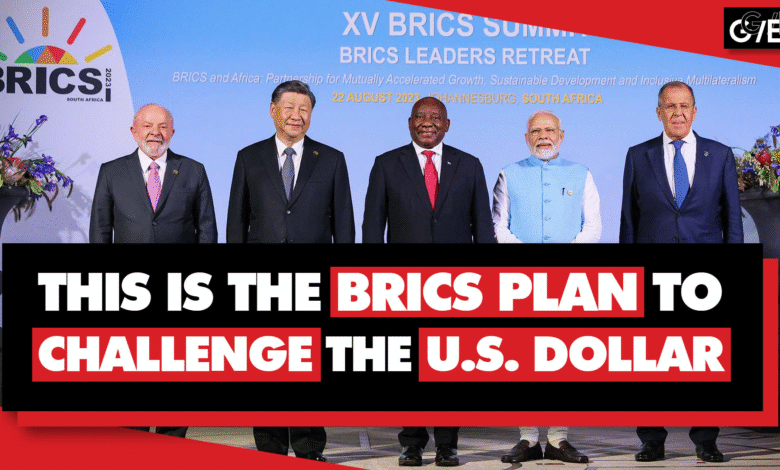BRICS Dollar Dominance: Ron Paul’s July Strategy Explained

The emergence of BRICS dollar dominance signals a potential seismic shift in the global financial landscape, as noted by Ron Paul. This coalition of emerging economies aims to challenge the long-held supremacy of the U.S. dollar through its strategic initiatives, particularly the upcoming July strategy. The so-called “Rio Reset” outlines crucial steps toward ending dollar supremacy, which has long facilitated U.S. global financial control. As BRICS nations — Brazil, Russia, India, China, South Africa, and others — work towards a collective monetary reset, the implications for international trade are profound. If successful, this could undermine the dollar’s position, leading to transformative changes in how trade is conducted worldwide.
The BRICS alliance, an aggregation of major emerging economies, is on the brink of reshaping global financial dynamics, often referred to as the new order in international finance. By advocating for currency alternatives and increasing local currency trade among member nations, they aim to reduce reliance on the U.S. dollar. This initiative echoes sentiments from economic thought leaders like Ron Paul, who assert that such strategies may herald the end of dollar dominance and a significant monetary shift. With talks of a planned July summit, the BRICS coalition is set to introduce frameworks aimed at fostering greater financial autonomy from traditional dollar-based systems. The ripple effects of this movement could redefine economic power structures across the globe.
Ron Paul’s Insights on BRICS Dollar Dominance
Ron Paul has been a vocal critic of U.S. monetary policy and has long predicted a significant shift in the global financial landscape. His recent remarks regarding the BRICS bloc’s upcoming strategy, termed the “Rio Reset,” underscore his concerns about the dominance of the U.S. dollar. Paul argues that this initiative could mark a pivotal moment in which the BRICS nations challenge the traditional reliance on dollar-based systems. Notably, he warns that such challenges could lead to a drastic reshaping of the global economic order, reducing U.S. influence and destabilizing financial markets worldwide.
In his analysis, Paul points to the potential consequences for everyday Americans, explaining that a decline in dollar supremacy could lead to diminished purchasing power. He emphasizes that the implications of a competitive environment for fiat currencies could be severe, potentially leading to inflation and a negative impact on savings and retirement funds. Hence, Paul’s perspective highlights the urgency of the BRICS nations’ actions and the need for the U.S. to prepare for a rapidly approaching monetary reset.
The BRICS July Strategy: A Challenge to Dollar Hegemony
As the BRICS nations prepare for their summit in July 2025, their strategy aims to create a robust alternative to the dollar’s established dominance in global trade. This July strategy is intended not just as a mere discussion point but as a concrete initiative that could realign international trade by promoting transactions in local currencies. The groundwork laid by Brazil, Russia, India, China, and South Africa hints at a more significant movement away from dollar reliance, as these countries seek greater financial sovereignty.
The initiative is expected to pave the way for a fundamental shift in how trade is conducted among these nations, further weakening the dollar’s monopoly. Reports indicate that over 65% of trade among BRICS nations has already shifted to local currencies, marking a significant decline in the dollar’s share. This strategic shift aligns with Ron Paul’s assertions that the BRICS alliance is joining forces to challenge dollar supremacy in a way that could fundamentally alter international financial practices moving forward.
The Impacts of a Monetary Reset: Understanding the Stakes for Global Economies
The potential impacts of the BRICS monetary reset cannot be overstated, as they threaten to disrupt the long-standing U.S.-centred financial system. Experts predict that if BRICS successfully implements their strategy, it may initiate a domino effect, encouraging other nations to explore alternatives to the dollar. This development could lead to increased volatility in currency markets and a loss of the dollar’s status as the preferred reserve currency. Such a change not only affects trade dynamics but also has broader implications for global economic stability.
Additionally, the shift towards more localized currencies for trade settlements suggests that nations are proactively responding to economic uncertainties associated with fiat currencies. A move towards commodities, like gold, as a hedge against currency devaluation further supports this transition. As Paul highlights, the growing interest in gold reserves among central banks worldwide exemplifies the imperative for nations to secure their economies from potential currency collapses that could arise from heights of dollar supremacy.
Gold as a Hedge Against Currency Devaluation
In the light of emerging economic trends, Ron Paul emphasizes the enduring value of gold as a refuge against currency devaluation. With the BRICS bloc’s motivation to diminish the dollar’s influence, the historical significance of gold becomes increasingly relevant. Paul argues that transitioning to commodities, especially gold, offers a safeguard for individuals and institutions concerned about the effects of inflation and currency instability. By positioning assets in gold-backed options, investors can insulate themselves from the potential pitfalls of a fluctuating monetary landscape.
Furthermore, as BRICS develops alternative strategies for trade and financial transactions, gold presents a universally accepted form of value that transcends the volatility of fiat currencies. The current dynamics within central banks, which have increased their gold reserves, signal a strategic pivot toward assets perceived as stable and reliable in the face of monetary upheaval. Paul’s advocacy for gold serves as a reminder of the importance of taking proactive measures to preserve wealth amid an evolving financial system.
The Future of Global Financial Control with BRICS Ascendancy
The rise of the BRICS bloc introduces a compelling narrative regarding the future of global financial control. As these nations expand their influence, there exists a tangible threat to the established order dominated by the U.S. dollar. This potential shift raises crucial questions about how power dynamics in international finance will evolve. With BRICS poised to carve out alternatives, their success could signal a redistribution of economic power, compelling Western nations to rethink their approach to global markets.
Moreover, the implications of BRICS’ ascent are not confined to mere economics; they resonate through politics and international relations. Increased economic autonomy among BRICS members signifies a broader shift towards multipolarity in global governance. If successful, their strategy could lead to a reconfigured international order, where financial control balances between emerging markets and traditional Western powers. Understanding these shifts is essential for stakeholders in finance, policy-making, and global trade.
Senator Ron Paul’s Long-term Vision for Monetary Policy
Ron Paul’s vision for monetary policy articulates a future where sound money principles take precedence over fiat currency manipulation. His perspective emphasizes the risks associated with over-reliance on the dollar and the detrimental effects of excessive money printing on citizens’ financial well-being. Paul advocates for systemic reforms that restore stability through adherence to tangible assets like gold, which he believes should underpin a healthy economy. This vision underscores the importance of re-evaluating monetary practices amidst the challenges posed by evolving global economic landscapes.
As BRICS embarks on its mission to challenge the established dollar hegemony, the discourse surrounding monetary policy grows in urgency. Policies endorsing transparency, accountability, and sound money could become pivotal in restoring public trust in financial institutions. Paul’s long-term vision champions an approach that not only addresses current threats posed by BRICS but also establishes a pathway for effective monetary governance that respects citizens’ rights to financial security.
Strategic Alliances in the BRICS Bloc: Shaping Economic Futures
The BRICS network exemplifies the potential of strategic alliances in reshaping economic futures. With the collaboration of Brazil, Russia, India, China, South Africa, and other emerging economies, a collective effort to challenge dollar hegemony materializes. This collaboration enables member nations to leverage their strengths while addressing shared economic vulnerabilities. Exploring the synergies within these alliances offers insights into the collective economic strategies that could redefine global trade dynamics in the upcoming decades.
Furthermore, these strategic alliances enable BRICS nations to create a robust framework for negotiating trade agreements that prioritize local currencies. By uniting under common goals and aspirations, member nations can more effectively advocate for their interests on the global stage. As BRICS continues to develop its initiatives, the power of these alliances will be instrumental in crafting sustainable economic policies that enhance financial independence and mutual support among member states.
Navigating Risks in the New Global Financial Landscape
As the potential for a BRICS-led monetary reset emerges, understanding the associated risks becomes crucial for countries, investors, and policymakers alike. The transition towards a less dollar-dependent global economy may introduce volatility and uncertainties as nations adjust to new financial paradigms. Investors must navigate these complexities by assessing their exposure to potential fluctuations, which could substantially alter the investment landscape.
Moreover, the geopolitical implications of a shift away from dollar dominance may lead to heightened tensions among major powers. As countries adapt to this new financial reality, the interplay between economic policies and geopolitical strategies will become increasingly pronounced. Developing mitigation strategies in anticipation of these shifts will be essential for fostering stability and safeguarding economic interests during this transformative period.
The Role of Local Currencies in International Trade
The BRICS nations’ focus on enhancing trade settlements in local currencies represents a substantial shift in how international trade is conducted. By accentuating transactions in local currencies rather than relying solely on the U.S. dollar, these countries are championing a model that promotes greater financial independence and mitigates exposure to fluctuations in the dollar’s value. This strategy not only benefits individual nations but also stabilizes trade relationships within the bloc, fostering an environment where economic ties can flourish.
Adopting more localized currencies sets a precedent for other nations to reconsider their dependence on the dollar, creating a ripple effect in international finance. As BRICS nations successfully implement these initiatives, they may inspire broader efforts among other economic blocs to explore similar trade agreements. The transition towards localized currencies symbolizes a gradual or even rapid evolution in global trade practices, one that BRICS is poised to lead through its innovative monetary strategies.
Understanding the Political Implications of BRICS Initiatives
The political implications of BRICS initiatives extend well beyond financial concerns, influencing the broader geopolitical landscape. As member countries unify to challenge dollar dominance, their actions could have significant repercussions on international relations, reshaping alliances and rivalries. This collective approach enhances the negotiating power of BRICS nations on global platforms, enabling them to assert their interests more effectively and promote policies that reflect their economic priorities.
Moreover, the geopolitical ramifications of BRICS’ July strategy could prompt Western powers to reassess their positions and strategies in response to this united front. A potential shift in the balance of power may compel traditional financial centres to adapt, focusing on fostering relationships that align with emerging markets. Understanding these political dimensions will be crucial for comprehending the unfolding narrative of global economics and diplomacy as BRICS maneuvers towards redefining financial norms.
Frequently Asked Questions
How is the BRICS July strategy expected to challenge dollar dominance?
The BRICS July strategy, termed the ‘Rio Reset’, aims to diminish the U.S. dollar’s supremacy in global trade by promoting trade settlements in local currencies among its member nations. This initiative, led by Brazil, Russia, India, China, South Africa, and others, seeks to enhance financial sovereignty and reduce reliance on the dollar, potentially ending dollar dominance.
Who is Ron Paul and what is his role in discussing BRICS dollar dominance?
Ron Paul is a former congressman and a prominent advocate for monetary reform who has been vocal about the risks of dollar supremacy. He has predicted that the BRICS nations will create a significant challenge to the U.S. dollar through their ‘Rio Reset’ initiative, which he believes could reshape global financial control.
What potential implications does the BRICS July strategy have for U.S. economic power?
The BRICS July strategy could potentially undermine U.S. economic power by eroding the dollar’s status as the main reserve currency. If successful, this may lead to reduced purchasing power for everyday Americans and destabilize financial instruments like retirement accounts and pensions.
What actions are central banks taking in response to the threat of BRICS dollar dominance?
In response to the emerging threat of BRICS dollar dominance, central banks around the world are reportedly increasing their gold reserves. This shift indicates a broader movement away from reliance on the dollar and highlights the growing importance of alternative currencies as pointed out by Ron Paul.
What is the significance of the BRICS nations’ plan to increase trade settlements in local currencies?
Increasing trade settlements in local currencies among BRICS nations signifies a strategic move away from dollar dependence, which has historically dominated global trade for decades. This shift is seen as a crucial step towards establishing financial independence and challenging the existing dollar-based financial system.
How does Ron Paul’s view on gold relate to the discussion of BRICS dollar dominance?
Ron Paul emphasizes gold as a stable alternative to fiat currencies, particularly in the context of the BRICS strategy to end dollar dominance. He advocates for individuals to consider converting their retirement accounts to gold-backed options to safeguard against currency devaluation and the uncertainty posed by the BRICS initiative.
What historical changes in global currency dominance does Ron Paul refer to when discussing the U.S. dollar?
Ron Paul refers to the historical transition from the British pound to the U.S. dollar as the primary reserve currency, noting that such a transformation is happening again with the potential rise of BRICS currencies threatening dollar supremacy in international trade.
Will the BRICS nations move toward a single currency or focus on local currencies?
The BRICS nations have clarified that their primary goal is not to create a single currency but to enhance trade using local currencies among member states, thereby challenging BRICS dollar dominance without consolidating into one unified currency.
| Key Point | Details |
|---|---|
| Ron Paul’s Warning | Ron Paul believes that BRICS is set to challenge dollar dominance through a project called the ‘Rio Reset’. |
| The ‘Rio Reset’ Initiative | Scheduled for July 2025 in Rio de Janeiro, this plan aims to reshape international trade and reduce dependence on the U.S. dollar. |
| Potential Impacts on the U.S. Economy | If the dollar loses its reserve currency status, it could undermine the U.S. economic power, impacting purchasing power and government benefits. |
| Global Reaction | Central banks are increasing their gold reserves, hinting at a shift away from the dollar. |
| BRICS’s Approach | BRICS focuses on trade in local currencies rather than a single currency to replace the dollar. |
Summary
BRICS dollar dominance is on the horizon as Ron Paul predicts a significant shift with the upcoming ‘Rio Reset’. The initiative aims to reduce dependence on the U.S. dollar in global trade, potentially reshaping the financial landscape and impacting the U.S. economy. With BRICS countries advocating for local currency transactions, the current dollar supremacy may face unprecedented challenges, urging Americans to reconsider their financial strategies.




